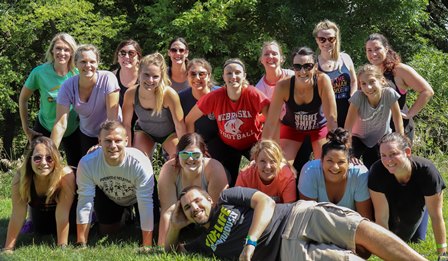Extraordinary Care
There’s a lot to learn for our nurse graduates as they begin their career at Nebraska Medicine. All of our new nurses participate in our one-year Vizient Nurse Residency Program. As part of the program, a new graduate is paired with a preceptor to help support them during their 12-week orientation and as they transition into their practice.
For nurses who work in the Emergency Department, the atmosphere provides a unique set of challenges, including patients who often need emergent treatment in a fast-paced environment.
Mentorship increases job satisfaction, longevity, and confidence
To better support new nurses in the ED, a mentorship program was developed two years ago at Nebraska Medical Center. As nurses complete their fellowship program, which is required as a new graduate in the ED, they are assigned a mentor.
“We realized when nurses come off fellowship, they lose that structured support,” says Kalen Knight, Nursing Professional Development specialist in the ED, who leads the program alongside Nicole Lenaghan, Nursing Professional Development specialist in the ED.
“From the data collected in nurse residency, we realized new nurses have a tendency to reach a low point in job satisfaction right around the time they complete orientation,” says Amy Mead, associate nurse manager, Emergency Department. “We recognized the need to help support each other long after a formal preceptorship ended.”

The nurses are encouraged to choose a mentor, who can be any nurse in the ED. Knight says nurses often choose their preceptor. “If a nurse says they don’t want a mentor, we still assign them one,” says Knight. “That way, if they ever need someone, they have a person to reach out to.”
The pair are encouraged to meet outside of work, but department leaders also plan group activities outside of work for team building.
“Being a new nurse is incredibly exciting, but that first year is hard,” he says. “You realize quickly there’s a lot you don’t know. So, it’s easy for a new nurse to become discouraged and to start questioning their career path. What a mentor can do is remind them it’s normal to feel this way.”
As part of the program, nurses take a pre and post survey that gauges job satisfaction, confidence and likelihood of remaining in their position.
“The feedback we’ve received has been positive,” says Knight. “Our goal is to support our new graduate nurses by ensuring each one has a mentor who is prepared to support them during challenges as well as celebrate their success.”
“In the ED, we see some really tragic things and it is important that all nurses and techs feel supported by their peers in order to develop the resiliency to continue to be able to perform the duties of the job and find enjoyment in the care they provide,” says Mead.